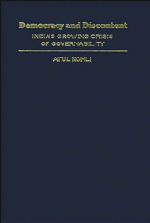Crossref Citations
This Book has been
cited by the following publications. This list is generated based on data provided by Crossref.
Gordon, Sandy
1993.
Resources and instability in South Asia.
Survival,
Vol. 35,
Issue. 2,
p.
66.
Chiriyankandath, James
1993.
Human rights in India: Concepts and contexts.
Contemporary South Asia,
Vol. 2,
Issue. 3,
p.
245.
Islam, Nasir
1993.
Book Reviews.
International Review of Administrative Sciences,
Vol. 59,
Issue. 1,
p.
163.
Sridharan, E.
1993.
Economic liberalisation and India's political economy: Towards a paradigm synthesis.
The Journal of Commonwealth & Comparative Politics,
Vol. 31,
Issue. 3,
p.
1.
Leftwich, Adrian
1993.
Governance, democracy and development in the Third World.
Third World Quarterly,
Vol. 14,
Issue. 3,
p.
605.
Jeffrey, Robin
1994.
What’s Happening to India?.
p.
46.
Sherlock, Stephen
1994.
Conflict and competition: The labour movement and organised communalism.
South Asia: Journal of South Asian Studies,
Vol. 17,
Issue. sup001,
p.
169.
Chaudhuri, Joyotpaul
and
Schiller, David C.
1994.
Raj, Ram and Rahim: The many faces of secularism in India.
Asian Journal of Political Science,
Vol. 2,
Issue. 1,
p.
66.
Das, Ajit K.
and
Kemp, Sharon F.
1994.
The human dimension of development in India.
International Journal for the Advancement of Counselling,
Vol. 17,
Issue. 3,
p.
193.
Rouyer, Alwyn R.
1994.
Explaining economic backwardness and weak governing capability in Bihar state in India.
South Asia: Journal of South Asian Studies,
Vol. 17,
Issue. 2,
p.
63.
Blomkvist, Hans
1995.
Is the State in India Particularistic?.
Forum for Development Studies,
Vol. 22,
Issue. 2,
p.
285.
Pinto, Marina
1996.
Democratization and Bureaucratic Neutrality.
p.
255.
Sonntag, Selma K.
1996.
The political saliency of language in Bihar and Uttar Pradesh.
The Journal of Commonwealth & Comparative Politics,
Vol. 34,
Issue. 2,
p.
1.
Chaudhuri, Joyotpaul
1996.
Coalition, change and continuity: The mid‐1996 general elections in India.
Asian Journal of Political Science,
Vol. 4,
Issue. 2,
p.
1.
Basu, Amrita
1997.
Reflections on Community Conflicts and the State in India.
The Journal of Asian Studies,
Vol. 56,
Issue. 2,
p.
391.
Basu, Amrita
and
Kohli, Atul
1997.
Introduction Community Conflicts and the State in India.
The Journal of Asian Studies,
Vol. 56,
Issue. 2,
p.
320.
Gordon, Sandy
1997.
Globalisation and economic reform in India.
Australian Journal of International Affairs,
Vol. 51,
Issue. 1,
p.
73.
Kohli, Atul
1997.
Can Democracies Accommodate Ethnic Nationalism? Rise and Decline of Self-Determination Movements in India.
The Journal of Asian Studies,
Vol. 56,
Issue. 2,
p.
325.
Das, Dilip K.
and
Verma, Arvind
1998.
The armed police in the British colonial tradition.
Policing: An International Journal of Police Strategies & Management,
Vol. 21,
Issue. 2,
p.
354.
Chowdhury, Supriya Roy
1999.
Neo-statism in Third World studies: A critique.
Third World Quarterly,
Vol. 20,
Issue. 6,
p.
1089.





